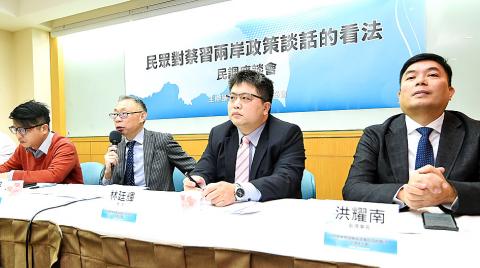More than 80 percent of Taiwanese do not accept the “one country, two systems” formula and a majority reject the existence of the so-called “1992 consensus,” a survey published yesterday by the Cross-Strait Policy Association found.
Asked whether they supported Chinese President Xi Jinping’s (習近平) proposal of a “one country, two systems” model for unification, which would make Taiwan a local government and eliminate the Republic of China (ROC), 80.9 percent answered “no” and 13.7 percent said “yes.”
Even among respondents who identify with the pan-blue camp, the majority — 64.7 percent of Chinese Nationalist Party (KMT) supporters and 63 percent of People First Party supporters — rejected the formula, the survey found.

Photo: Chu Pei-hsiung, Taipei Times
In addition, 68.5 percent did not think Beijing’s “one China” principle has room for the ROC, versus 25.5 percent who believed it does.
As for the “1992 consensus,” 55.7 percent of respondents did not think it exists, while 34.1 percent thought otherwise, with pan-blue supporters generally believing in its existence, the poll showed.
The “1992 consensus” — a term former Mainland Affairs Council chairman Su Chi (蘇起) in 2006 admitted making up in 2000 — refers to a tacit understanding between the KMT and the Chinese Communist Party that both sides acknowledge there is “one China,” with each side having its own interpretation of what “China” means.
However, Xi in a speech in Beijing on Wednesday last week said that it means “both sides of the [Taiwan] Strait belong to ‘one China’ and will work jointly to seek national unification.”
Seventy-eight percent of respondents agreed with President Tsai Ing-wen’s (蔡英文) stance that cross-strait political negotiations need a mandate from the people, should be subject to public scrutiny and must be carried out by the governments on both sides of the Strait.
Tsai was responding to Xi’s expression of willingness to engage in dialogue on unification and cross-strait political issues with all political parties, groups and individuals from Taiwan on the basis of the “one China” principle.
Tsai’s “four musts” and calls for setting up of a three-part security network for cross-strait exchanges in her New Year’s address received overwhelming public support, garnering support from 85.2 percent and 87.3 percent of respondents respectively, the poll showed.
The “four musts” state that China must recognize the existence of the ROC; must respect the values of democracy and freedom that Taiwan’s 23 million people hold dear; must resolve cross-strait differences in a peaceful and equitable manner; and must engage in negotiations with the government of Taiwan or an institution with a government mandate.
The three-part security network includes parts to strengthen security of people’s livelihoods, enhance information security and improve security protecting democracy in cross-strait interactions.
Asked if they were satisfied with Tsai’s overall response to Xi’s speech, 61.6 percent answered “yes,” while 28.2 percent said “no.”
The poll, conducted on Saturday and Sunday, collected 1,047 valid samples, and has a confidence level of 95 percent and a margin of error of 2.99 percentage points.

Intelligence agents have recorded 510,000 instances of “controversial information” being spread online by the Chinese Communist Party (CCP) so far this year, the National Security Bureau (NSB) said in a report yesterday, as it warned of artificial intelligence (AI) being employed to generate destabilizing misinformation. The bureau submitted a written report to the Legislative Yuan in preparation for National Security Bureau Director-General Tsai Ming-yen’s (蔡明彥) appearance before the Foreign Affairs and National Defense Committee today. The CCP has been using cognitive warfare to divide Taiwanese society by commenting on controversial issues such as Taiwan Semiconductor Manufacturing Co’s (TSMC, 台積電) investments in the

INVESTIGATION: The case is the latest instance of a DPP figure being implicated in an espionage network accused of allegedly leaking information to Chinese intelligence Democratic Progressive Party (DPP) member Ho Jen-chieh (何仁傑) was detained and held incommunicado yesterday on suspicion of spying for China during his tenure as assistant to then-minister of foreign affairs Joseph Wu (吳釗燮). The Taipei District Prosecutors’ Office said Ho was implicated during its investigation into alleged spying activities by former Presidential Office consultant Wu Shang-yu (吳尚雨). Prosecutors said there is reason to believe Ho breached the National Security Act (國家安全法) by leaking classified Ministry of Foreign Affairs information to Chinese intelligence. Following interrogation, prosecutors petitioned the Taipei District Court to detain Ho, citing concerns over potential collusion or tampering of evidence. The

‘COMPREHENSIVE PLAN’: Lin Chia-lung said that the government was ready to talk about a variety of issues, including investment in and purchases from the US The National Stabilization Fund (NSF) yesterday announced that it would step in to staunch stock market losses for the ninth time in the nation’s history. An NSF board meeting, originally scheduled for Monday next week, was moved to yesterday after stocks plummeted in the wake of US President Donald Trump’s announcement of 32 percent tariffs on Taiwan on Wednesday last week. Board members voted to support the stock market with the NT$500 billion (US$15.15 billion) fund, with injections of funds to begin as soon as today. The NSF in 2000 injected NT$120 billion to stabilize stocks, the most ever. The lowest amount it

NEGOTIATIONS: Taiwan has good relations with Washington and the outlook for the negotiations looks promising, Minister of Economic Affairs J.W. Kuo said Taiwan’s GDP growth this year is expected to decrease by 0.43 to 1.61 percentage points due to the effects of US tariffs, National Development Council (NDC) Minister Paul Liu (劉鏡清) said at a meeting of the legislature’s Economics Committee in Taipei yesterday, citing a preliminary estimate by a private research institution. Taiwan’s economy would be significantly affected by the 32 percent “reciprocal” tariffs slapped by the US, which took effect yesterday, Liu said, adding that GDP growth could fall below 3 percent and potentially even dip below 2 percent to 1.53 percent this year. The council has commissioned another institution